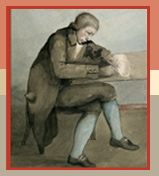
Gweithiau eraill
Siencyn Morgan at I.M., 30 Tachwedd 1771
Owen Jones at I.M., 11 Gorffennaf 1779
Daniel Walters at I.M., 27 Mehefin 1782
Edward Eagleton at I.M., 3 Awst 1782
Owain Myfyr at I.M., 30 Medi 1782
Daniel Walters at I.M., 1 Hydref 1782
John Walters ieu. at I.M., 4 Mawrth 1783
I.M. at Owen Jones, 20 Medi 1783
I.M. at William Meyler, 1 Ionawr 1792
Margaret Williams at I.M., 1 Ionawr 1793
Walter Davies (Gwallter Mechain) at I.M., 16 Mai 1793
I.M. at Edward Jones, 1 Ionawr 1794
I.M. at Margaret Williams, 19 Chwefror 1794
I.M. at Y Parch. Hugh Jones, 4 Mehefin 1794
I.M. at Margaret Williams, 27 Awst 1794
I.M. at William Matthews, 18 Gorffennaf 1796
I.M. at y Bwrdd Amaeth, 28 Gorffennaf 1796
William Matthews at I.M., 6 Hydref 1796
I.M. at Syr Richard Colt Hoare, 17 Awst 1797
I.M. at William Owen Pughe, 20 Rhagfyr 1798
William Owen Pughe at I.M., 28 Awst 1800
I.M. at David Williams, 1 Ionawr 1803
I.M. at Owen Jones, 5 Ebrill 1806
I.M. at Taliesin Williams, 16–17 Awst 1813
I.M. at Benjamin Hall, 14 Mawrth 1816
I.M. at Ynadon Y Bont-faen, 13 Mawrth 1818
William Jenkins Rees at I.M., 28 Ionawr 1822
Iolo Morganwg at Evan Evans, 1 Ebrill 1779
(NLW 21319E, rhif 11)
Iolo Morganwg to Revd Evan Evans
1 April 1779
Postmark: none
Source: NLW 21419E, no. 11
Status and condition: only a fragment of the letter remains intact
Your favour of March 9th I received. You give the names of many writers of Welsh history, and I understand that they all wrote in the Welsh language. Now I should esteem it a favour if you will be pleased to answer the following enquiries to the best of your knowledge.
Are all those manuscript histories still extant? If they are in whose hands?
1. Are any of them in the English language for his language was spoken of pretty generally in many parts of Wales so far back as the 13th century. Adam Davie, who wrote a romance in English verse, was a Welshman, and the tutor of Gower as appears from a note in a copy of that romance in the Litchfield library.
2. Howel Surdwal wrote in Latin it seems. Is his history extant, and did any other bard write in Latin?
3. Having in your language so much materials for a history, not only of Wales but of all Britain, why are they not given to the public for such publications would certainly be properly encouraged?
4. Some of the historiographical and genealogical bards in your list are said to have had deputations from the Heraldry Office, other wise by you called chafers, or from Garter at Arms, as you express it. Are any of those charters extant.
5. The adder stones you sent me from Cymmer Abbey are glass beyond a doubt, and may they not have been monks beads? That the fabulous story of the adder stone and serpents egg is still rife and believed in Wales is singular, and an additional proof to what has already been advanced that the Welsh are of the same origin as the Celtic Gauls who had the same stories amongst them.
You say that you have visited more than fifty circles of stones in Wales. There are not in all Britain besides half the number to be found as far as I have understood. How do you account for this?
What are the popular traditions relating to those circles of stones, and other ride erections of large stones. Are called by any particular names, as the Giants Dance, Stonehenge &c in England and what do such names signify?
These numerous histories of the [?] [----] comparatively, but of modern periods.
Can you inform me when the English language began [--] popularly spoken in Wales? In a north Wales in was spok[en] [--] the common people in the time of Edward the First, as appears in [--] papers in the Tower. It was so early spoken I believe in Pembrokeshire, and in Gower in Glamorganshire.
You tell me that within the memory of men now living, and even within your own memory, that the Latin language was taught in all the common schools in west Wales, and that the common farmers labourers and shepherd could converse in Latin though not in English. This is curious. Has the Latin in any degree continued as a language popularly spoken ever since the Roman period in Wales do you think? I think that I could produce notices of popular Latin in some parts of England from the Roman ages down to the Conquest, and possibly till a later period, but the Norman language superceded both it and the Saxon. I lament the loss of the Saxon language. Had it underwent the gradual self culture of time it would have become a most noble and powerfully significant language, much superior to out modern English (which, however, is one of the best of modern languages) because (like your Welsh language, according to your account of it) its words would have been all from roots of its own which would have been popularly understood by the common people, which our present English never with never can be. It will experience, sooner or later, the fate of the Rom[an] Latin which was a powerful language, but too artificial. It was only a learned language to even the provinces of Italy, and when Rome fell its language fell, and the popular dialects of the country found their level in the present Italian language, which then as now had strong tinctures of the Gallic and Helvetic dialects. I have longed for an opportunity of showing you my respects which are greater than what the trifle you herewith receive can express. Do not mention it to any one.
The Correspondence of Iolo Morganwg, I, tt. 140-2

